Systems | Development | Analytics | API | Testing
%term
How to Autoscale Kubernetes Pods with Keda - Testing with k6
This article demonstrates how to Load Test an application deployed in a Kubernetes cluster, verify that the autoscaling is working, and identify potential performance bottlenecks. When you deploy an application to production on Kubernetes, you'll need to monitor traffic and scale up the application to meet heavy workloads during various times of the day. You'll also need to scale down your application to avoid incurring unnecessary costs.
Global power supplier gains 50% testing efficiency with Xray
Established in Denmark in 1933, the DEIF Group is a global market leader in green, safe and reliable control solutions for decentralised power production on land or at sea. In simple terms, they make sure power is always available. DEIF Group is staffed by more than 550 employees and represented in 50+ markets in all regions of the world.
Kong for Kubernetes 0.9 Released With Encrypted Plugin Configuration and More!
Kong for Kubernetes is a Kubernetes Ingress Controller and a full-fledged edge-router which can route traffic to any destination of your choice. In addition to Ingress management, it provides enhanced security and management capabilities. With Kong, you can use Kubernetes not just for running your workloads but also for securing and monitoring connectivity between your workloads – all managed via Kubernetes manifests and CI/CD processes.
Best pre-COVID-19 events for engineers
Events and Conferences are a core element of any growing industry and ours is no different. It’s the easiest way to learn what’s new and to gain a better understanding of any technology. After all, we might love blogs and online courses, but at the end of the day, is there a better way to process any type of information than a passionately delivered speech or a lively discussion?
Try N|Solid - A Ready Made Demo
You asked and we listened. Until today, trying our novel approach to monitoring performance, diagnostics and security required bringing your own application and load testing environment. Our latest release of N|Solid 3.12 changes this. We are excited to announce the launch of ‘Try N|Solid’ a new, one-command , zero-config way for you and/or your colleagues to experience the power of our Node.js Enterprise Runtime (N|Solid) 💪.
It's time to lift the lid on your organization
One of the big standouts for me in the recent environment is just how much of a shock COVID-19 has been for organizations. This is because many have become complacent about their data over the past decade and they’re now exposed. As Warren Buffet said, "Only when the tide goes out do you discover who's been swimming naked." To deal with the current economic situation everyone now has to lift the lid on their organization.
Unravel Now Supporting Databricks on Amazon Web Services
Since the very beginning, Unravel Data has made it a mission to ensure customers are successful, wherever they deploy their modern data platforms. On-premises, in the cloud, and in hybrid environments, Unravel supports the full stack of data processing engines to provide data operations visibility wherever it resides.
Splunk - Creates real-time business impact from data
From dealing with security concerns to production monitoring, businesses need to analyze the log data of their systems to ensure everything is functioning normally. In a computing context, a log refers to automatically produced and time-stamped documentation of events related to a particular system. Analysis of log data helps businesses comply with regulations, security policies and audits, understand online consumer behavior, and comprehend system troubleshoots.
Sharing Variables Between Virtual Users
Variables, may they be constant or dynamic, are an essential part of load testing. We already learned how to manipulate these values by extracting and re-injecting them inside one Virtual User. But what if we need to share these values between several Virtual Users ? In this blog post, I will show you just how to do that, using the MQ technology.











